There are several BBQ related questions asked in forums and social media groups that are bound to have people enthusiastically posting their popcorn eating memes. What is the best BBQ rubs is one such question, which will ultimately have people argue with each other until they are blue in the face.
A common bone of contention is whether store-bought or homemade rubs are best, with no consensus ever being formed. Thankfully I think both have their time and place so will put forward the reasons to buy rubs from the store and why you should also learn to make your own.
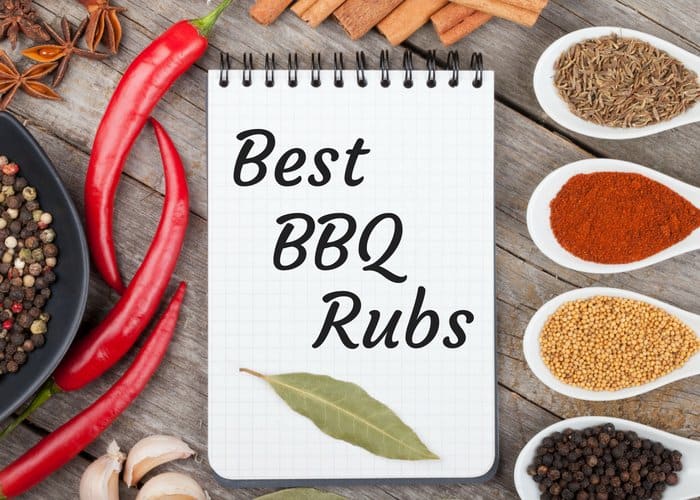
Contents
Basic Rub Definitions
Even simple terms such as BBQ have varying definitions depending on where you live in America. I use it as an all-encompassing word, I could be talking about a grill, food, sauce or cookout. For others, BBQ is “low and slow” smoked food. It’s similar when we talk about the process of adding extra flavor to meats, seafood and veg – It’s because many of the terms have a lot of overlap.
Below I’ve given a description of the basic terms used when talking about BBQ rubs, but also a list of many other terms used when talking about flavoring BBQ food that some people might use thinking it’s all the same. Click the term in the list to see our articles on each BBQ flavor enhancer.
Seasoning
Seasoning is often just salt and pepper, but other spices are sometimes used. What differentiates seasoning from other barbecue flavor enhancers is that it’s applied moments before going in the grill or even while cooking.
BBQ Rubs
The best BBQ rubs are like seasoning on steroids. They have the saltiness of salt and the fiery kick of spices just like seasoning, but also have the sweetness of sugar or other sweeteners along with sour lemon juice or citrus fruit. This makes up the four cornerstones of a great rub – salty, spicey, sweet and sour. Then add some herbs for a wonderful fragrance and you’re not far off a world-class BBQ rub.
BBQ rubs, whether dry rubs or wet rubs, are applied to food several hours or more prior to cooking. Their purpose is to have a marinading effect on the meat or seafood.
Dry Rubs
Dry rubs, as the name suggests, are dry versions of our BBQ rub description above. So you’ll only use dry herbs, spices, etc, normally ground up. When using a dry rub you should towel-off any moisture on your food before adding it. To add a dry rub you simply sprinkle it all over your food in an even distribution.
Wet Rubs
Wet rubs are one of the BBQ flavor enhancers that are the main culprits for the confusion in terminology I talked about earlier. A wet rub is often called a spice paste, so having two names already confuses some people. But a wet rub is also a marinade. Note that just because something is a marinade it doesn’t mean it’s a wet rub. So all wet rubs (spice pastes) are marinades but not all marinades are wet rubs.
Wet rubs are similar to dry rubs except a liquid is added to form a thick paste, hence also being referred to as spice paste. The liquids used are normally oil, yogurt or even just water.
Other Flavor Enhancers
A list of other methods and techniques to add flavor to BBQ food
- Marinades
- Brines
- Cures
- Bastes
- Flavored Oils
- Glazes
- Butters
- Finishing Sauces
- Slather Sauces
- Dipping Sauces
- Salsa
- Chutney
- Relish
Safety
I can hear you chuckling at the fact I have a chapter on safety for an article on best BBQ rubs. We are hardly talking about dangerous combustibles or weapons. We are talking about herbs and spices. How dangerous can it be? Thankfully for the rubs themselves, not dangerous at all. Unless you’re dicing up some crazy hot chili and decide to rub your eyes with the juice still all over your hands. I just have to assume no one reading this is that silly. However, you will be using your BBQ rubs on raw meat, and this can be dangerous if you don’t keep to some simple hygiene standards.
Gloves – When you apply a BBQ rub, particularly if you are massaging it in, make sure you wear a pair of disposable food preparation gloves. You’re applying the rub while the meat is raw so wearing gloves ensures you keep all bacteria off your hands and prevents cross contamination. Wearing gloves is even more important when applying a BBQ rub to chicken. Chicken is renowned for giving people food poisoning, so don’t skip basic hygiene rules.
Cutting Boards – It’s very often the case that people apply rubs on the same board they have cut or trimmed their meat. Be sure to have two cutting boards if you then plan to cut the meat after cooking. You don’t want raw meat and cooked meat to have been on the same surfaces.
Plates – Exactly the same rule applies with your transporting plates. Too often I see people apply their BBQ rub in the kitchen, place their meat on a plate to transport it to the grill and then once cooked they use that same plate to transport the meat back for final prep. Don’t do this. Always use two plates.
Equipment
Having a big list of equipment probably isn’t what you expected when researching what’s the best BBQ rub. If you’re a beginner at cooking quality BBQ food you’ll not need most of this stuff as you’ll either buy a ready-made rub or will be simply mixing together a few store-bought dried herbs and spices that have already been ground down. But I think it’s worth giving you a rundown on all the gear you’ll need if you decide to up your game to competition level BBQ food.
Mortar and Pestle – As a young child the only place I saw a mortar and pestle was in the science lab at school. So I was a little surprised when I started to take barbecue food seriously that this is a standard bit of kit for people to make their own rubs.
It turns out that a mortar and pestle is actually a kitchen implement used since ancient times, and although there have been uncountable kitchen gadgets in its lifespan, nothing returns quality ingredients like a mortar and pestle. Not even high tech gadgets like a food processor.
The reason why a mortar and pestle is still seen as the best tool for crushing ingredients for a BBQ rub is to do with some science wizardry. Some ingredients have their flavor intensified when brought into contact with air. Crushing mortar and pestle style brings much more of the surface area into contact with air than any blender or food processor and therefore results in the rub having a more intense flavor.
Although hard to find, I’d recommend buying a mortar and pestle that has a 32oz capacity and interior wall hight of six inches. Most mortars (the bowl part) sold in the US are pretty small. This does make them good-looking kitchen ornaments, but when you come to crushing food you’ll find bits flying out the bowl. You’re only likely to find such a bowl at an ethnic market. Until you can find one, this mortar and pestle from Laevo Cook should see you through.
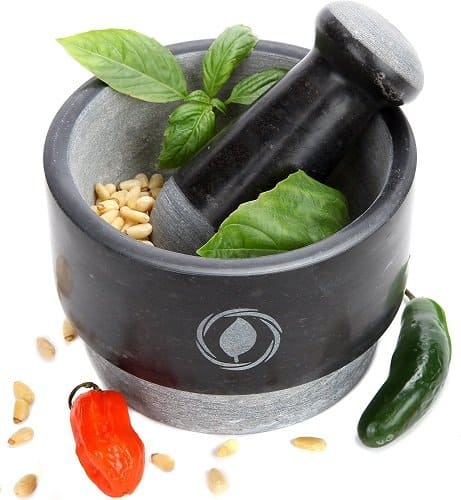
Measuring Cups and Spoons – It may seem that many of the great chefs you see on TV fly by the seat of their pants when it comes to measurements. A splash of this and a dash of that. But these are professionals with years of training and experience. They know pretty much the measurements they are adding by feel and sight. For the rest of us, it’s best to use measuring cups and to record what we do so we can reproduce it if we find a winning formula. New Star Foodservice do a great measuring cup and spoons set.
Spice Mill – Buying whole spices and grinding them up will give a far better taste. Most spices are best used within two months. So it makes sense to buy whole spices instead of pre-grounded spices. Spice mills and coffee grinders are the same things, so you can buy either, just remember that if you use one for spice’s then you shouldn’t then use it for coffee again. An electric one I can recommend is the Krups grinder.
Scales – Something you’re likely to already have laying around the house – kitchen scales. It’s pretty obvious why having scales are a great tool to have available when making rubs. Adding the right proportions of herbs and spices can make the difference between a well-balanced rub and one that has an overpowering individual spice. If you don’t have any scales I recommend the Ozeri digital multifunction kitchen scales.
Meat Injectors – Injecting flavors deep into the center of your slab of meat has become the norm on the competition circuit and is now very popular with backyard pitmasters. I highly recommend you give this a try and have written a whole article with my best meat injector recommendations.
Cast Iron Skillet – Rubs will taste better the fresher the ingredients. That’s why it’s best to buy whole spices and then roast them in a skillet before grinding them. Lodge is the number one name in cast iron products and they make a great ten-inch skillet that is perfect for the job.
Food Processor – A great tool for wet rubs and marinades, nothing is better than a food processor for reducing herbs, fruit and vegetables into a tasty paste. A great food processor is the Cuisinart processor or for a cheap alternative the Hamilton Beach food processor.
Blender – If you can only afford a food processor or a blender I’d say you should get the food processor, but in the perfect world you’d have both nothing beats a blender when it comes to making flavored oils. You can’t go wrong with the Ninja Professional Blender.
Mixing Bowls – Another piece of equipment for making BBQ rubs that you are very likely to already have sitting around the house. But if you don’t, I’d recommend buying a big set of stainless steel bowls. Spillage is much more likely if you only have small bowls. Finedine makes an excellent set of nesting mixing bowls that have every size you’ll need.
Marinating Containers – This can be any container, but some are better than others. Use containers that don’t react to acidic ingredients, so no cast iron or aluminum. Sealable containers are better than open containers, and better still would be vacuum sealed containers. I recommend the Food Saver container.
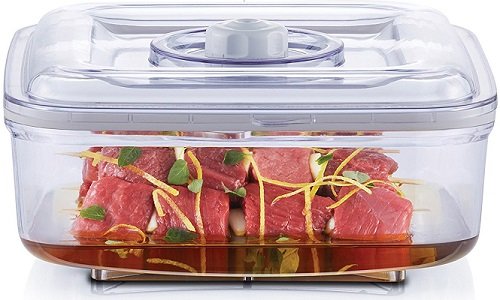
Storage Jars – If you’re going to make a batch of BBQ rub, especially if you’re making it from whole spices, you’ll need somewhere to store it – as you’ll not be making the rub for just one meal. You’ll want jars that are airtight and lets you label them so you know what’s in the jar at a later date. Talented Kitchen jars are a great example of good rub jars.
Knives – If you like great tasting home cooked food, one of the best investments you can make is a set of quality knives. Knives are expensive and we have written a whole guide on the best BBQ knives so you don’t make a mistake when buying. A chefs knife is what will be best for chopping herbs and spices.
Zester – Orange, lemon and lime peel are excellent additions to rubs. So a quality zester will come in handy.
Gloves – I’ve already mentioned the reason to have food-safe gloves when applying BBQ rubs to meat in the safety section. The Safety Zone food preparation gloves are the gloves I recommend.
| Some more great flavor guides |
|---|
| How to use Dry Rubs |
| BBQ Suaces |
| Chicken Injection Recipes |
Best BBQ Rub to Buy
Time and money. The two things we could always have more of. But as we are generally short of time or money, buying a rub from the store rather than the individual ingredients and making our own rub makes perfect sense a lot of the time.
So we are clear there isn’t one rub that is best for everything. Different cuts of meat taste better when paired with specific flavors. So for this best BBQ rub guide, I’ll give you my favorite store bought rubs for several of the most popular meats used for BBQ food.
I have to say, I make my own rub most of the time, and I recommend everyone that is serious about BBQ food to do the same. But I still buy pre-made rubs regularly, just because I like to try the new rubs everyone is talking about in the facebook groups I follow. Often all the talk is just hype, however, once in a while you find an excellent rub. Then I just check the ingredient list and start making my own with little twists more suited to my tastes (I enjoy spicy rubs, most store-bought rubs cater towards more general taste palate. I also like to reduce the amount of salt that comes with many store-bought rubs).
Pork Rubs
Bad Byron’s barbeque rub is probably the most famous rub among backyard pitmasters. Byron is a classically trained chef but had a passion for BBQ food. He traveled the BBQ competition circuit for many years, ranking in the top ten for several of these years. Many of his accolades are due to his signature rub called Butt Rub (many rubs made by people from the BBQ competition circuit have names that big corporations would never use). Butt Rub is excellent on pork and particularly for making pulled pork with a Boston butt.

Beef Rubs
If you’re looking for the best BBQ rubs, the place to start looking is at the people and teams that have won BBQ awards. That’s what we’ve done with our best pork rub and is also the case with this best beef rub recommendation – Oakridge Black OPS Brisket Rub. Oakridge is run by an award-winning griller that also sponsors many other top BBQ teams. So is always getting great feedback on what makes a terrific BBQ rub.
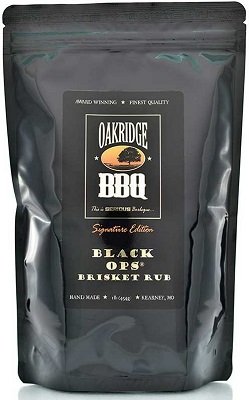
Chicken Rubs
Chicken is a BBQ classic; I love doing rotisserie chicken, my better half loves chicken thighs. Everyone has a favorite chicken dish because chicken is so versatile and absorbs flavors easily and quickly. I’ve tried more chicken rubs than all other meat rubs put together and it’s hard to choose a favorite. But I am going to recommend Plowboys Yardbird rub, made by another BBQ competition award winning team.
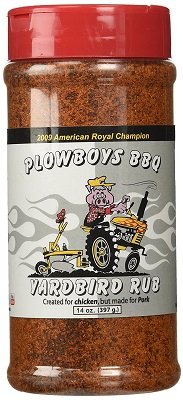
Lamb Rubs
I like lamb with mint sauce, but if I am going to add a rub I normally go for a garlic rub and maybe add a few herbs. And that’s why I’m recommending Miners Mix XXX garlic seasoning. Miners Mix has the slogan “If it didn’t exist in 1850, it ain’t in here”, which is a reference to the fact they use all natural ingredients and no additives or artificial flavors.
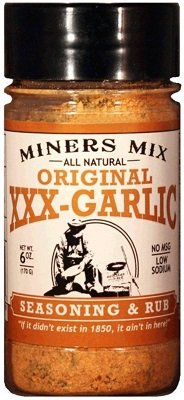
All Rounder Rubs
Another great rub from a fantastic BBQ team, and has to be in any best BBQ rub guide, is Killer Hogs aptly named The BBQ Rub. Yeah, it doesn’t look like they put much effort into the naming of this rub, but The BBQ Rub is one that every new pitmaster should give a try.
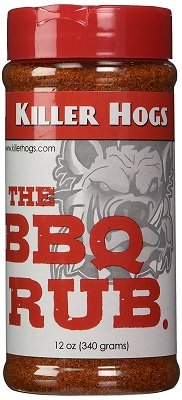
Make your own rub
I’ve now given you details on how to be food safe when using BBQ rubs, the equipment you need to make the whole process as painless as possible, and I’ve given you a selection of the best store bought BBQ rubs for you to test and work out what flavor combinations you like. The only thing left is to make your own BBQ rubs.
Your first goal should be to start with the freshest herbs and spices. My grandmother probably has tubs containing spices that are older than me and I know many people that herbs, spices or rubs that they’ve had for so long I’m surprised they haven’t been given names and become members of the family.
It seems most people aren’t aware that spices start to lose their aroma and taste within a few months. So I recommend buying a usable amount of whole spices, before roasting them on a skillet and then grinding into a powder and storing them in airtight jars. A usable amount is what you will definitely use in a six months period. I normally add a sticker with the date of when this was done so I know how old the spices are.
If you’ve bought whole spices like I’ve recommended, the next step is to roast them in a skillet over a medium heat until they release their aroma. This smell is due to the spices releasing their essential oils which will give the spices extra flavor when ground.
Use an electronic spice grinder or coffee grinder on your spices. It’s ok doing this job with a manual grinder if all you are doing is seasoning with a little salt and pepper. But I assure you that you’ll give up on making your own rubs after a couple of batches or have forearms like Popeye if you don’t use an electronic grinder.
Now for the difficult part – knowing which herbs and spices to mix together to make the best BBQ rub you have ever tasted. Of course this is down to individual tastes but all the best BBQ rubs follow the rule of trying to hit your taste buds from every different angle. Meaning you should add something that brings some heat, a sour ingredient, some salt and whether you have a sweet tooth or not, something sweet.
Now you need to experiment by mixing your favorite herbs and spices together. Just remember to write down what you do each time you make a rub. The last thing you want to do is make the perfect rub and all it becomes is a distant memory instead of your signature taste all your friends and family look forward to eating.